Rocksmith Review
Rhythm games have been around since the dawn of time (well, the 1970s, but that’s before my time so as far as I’m concerned, it’s the dawn of time), starting in the form of dancing games and later adding instruments into the mix. With every new game comes a new accessory and my brothers old room is starting to look like a museum of an age gone by as it fills with drums, keyboards, guitars and dance mats gathering dust and I’m pretty sure I saw a small child living in there once.
Now we have been granted the ability to toss aside all of these plastic instruments and use any guitar or bass we choose! No more clicking noises as you strum, no more tapping away at buttons that stick and certainly no more overly expensive 100+ button monstrosities. I give you Rocksmith.
I’m sure a lot of you are scratching your heads and wondering how exactly you can use a real guitar in a game. I don’t know the technology behind it, all I know is that you are given a Rocksmith Real Tone USB cable - one end’s a USB and the other a guitar jack. Into the console, into the guitar, job done.
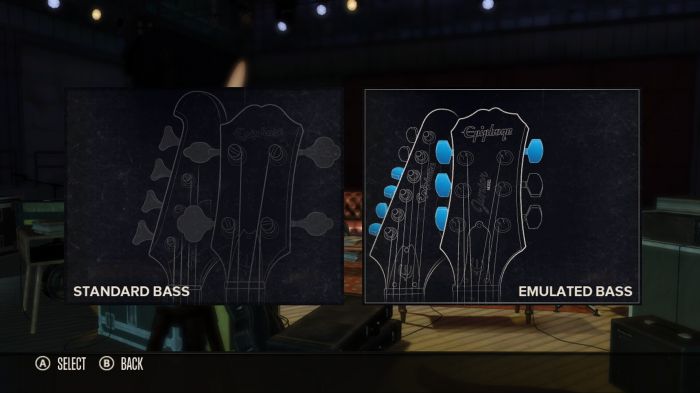
Like anybody, I’ve touched a guitar before but never had the patience to learn how the blasted thing worked. This is why I opted for perfecting my skill at Guitar Hero and the like because it was a lot simpler than learning to play an actual guitar. I heard about Rocksmith a couple of months back and was really excited by the concept of it, however fairly dubious of its claim to be able to teach anybody to play guitar.
Well, months later, I now have Rocksmith in my possession and all I can say is that I love it! (Well, that’s not all I can say, I mean, it wouldn’t be much of a review if you opened it up and just saw “I love it”.)
When you start up the game for the first time, you’ll be prompted to plug in your guitar and tune that beast and then you play your first riff! I felt like a god. A god who had to look at his hands every time I moved a fret but a god never the less. From here, you have a few options; you can jump into the story mode for both a guitar or a bass (you can also simulate a bass with a guitar by using just the top four strings), you can jump into playing any of the 50+ songs the game offers (without DLC), the Guitarcade (more on that later) or Amp mode.
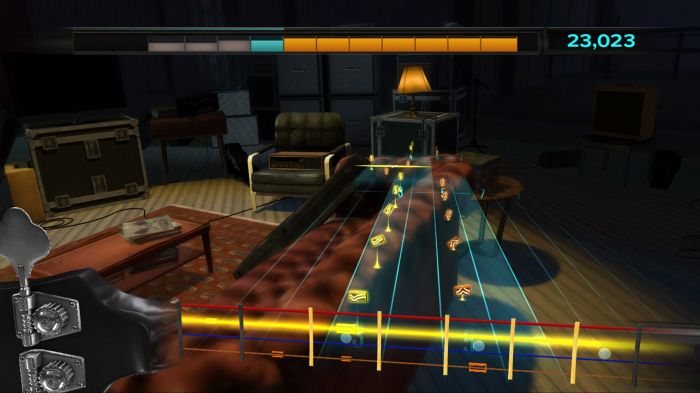
I think I’ll just get this one out of the way quickly. Amp mode does exactly what it says on the tin. It turns the game into an amp where you can use different guitars, amps and pedals and just rock out with your chicken out to your hearts content. Moving on.
As aforementioned, I’ve never touched a guitar, so I went into the story mode which helps to slowly build up your guitar skills and takes you through songs of that level. As you play through songs you have to hit a certain qualifying score to pass and then once you have completed the songs listed for that stage, you have to play them again as a performance (all in one gig type thing).
When you start a song for the first time, the difficulty will be set to the lowest possible. From here, as you get better, the difficulty will automatically adjust to your level. This sort of works. You can’t really change the difficulty manually other than resetting it to the lowest and often I would be happily strumming along and be thrown a chord, something I haven’t learnt, and just look blankly at the game saying “really Ubisoft, really?” Other than the occasional “really?” moment, this system seemed to work quite well for me and allowed me to slowly progress.
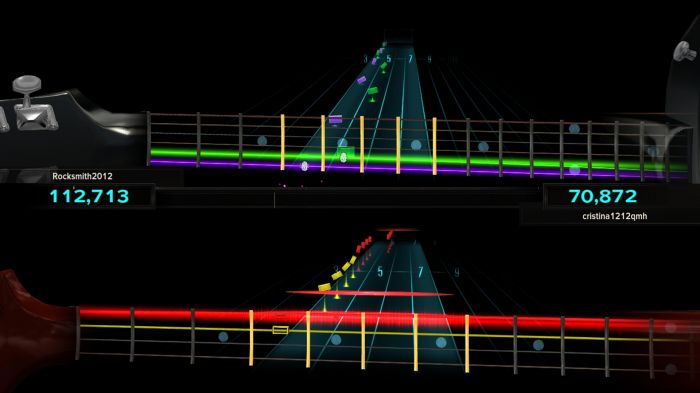
I think now would be a good time to tell you how you play. For anybody that has played any guitar game such as Rock Band, Guitar Hero etc. you will be familiar with this sort of screen, but for those who haven’t, here’s a breakdown.
You see the fretboard of a guitar on your screen. A note will come down the fretboard and you must “hit” it by strumming the correct note on your guitar. You distinguish between which note you should be playing by the colour and position of the note. Each string is assigned a certain colour - I’m sure at this point you will realise my complete lack of knowledge of guitars - the first string is red, the second is yellow and so on. The colour of the note is the string you are playing on. The position on the fretboard is the fret you should be holding down. That’s it, basically. Later on in the game, you will be thrown techniques like Sustains, Hammer-ons, Slides, Bends and so on but you needn't worry about that. As you progress through the story mode, Rocksmith will “recommend” you complete a Technique Challenge which will teach you how to do these. You can also access these from the main menu at any time. By completing these Technique Challenges you will unlock mini-games in the Guitarcade.
The Guitarcade is exactly what it sounds like, it’s an arcade of mini-games that you play with your guitar (do you see what they did there?). There are eight different mini-games that you can unlock and each of them helps you to practice a different skill. By progressing in the story mode, the first one that you will unlock is “Ducks”. This is a duck shooting game that helps you move around the fretboard quicker. Along with this you have a Tetris-style game using slides, a baseball game using bending, a zombie shooter using chords and just under a half-dozen others.
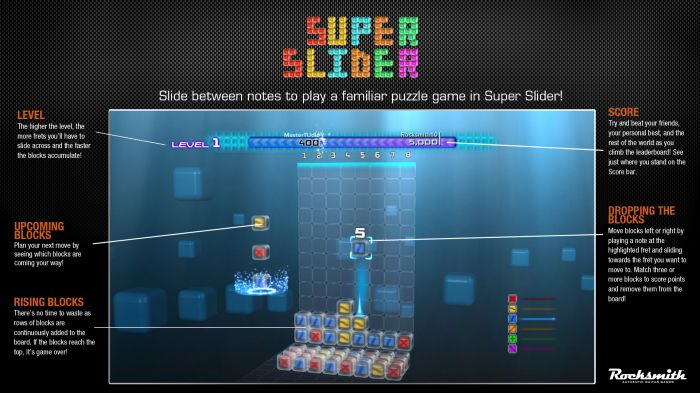
With this being a game filled with rock songs, you would expect there to be some mighty tasty riffs in there. Well, you won’t be disappointed. There are some of the classics in this game including Rebel Rebel - David Bowie, Sweet Home Alabama - Lynyrd Skynyrd, House of the Rising Sun - The Animals and many more. Again, going back to me being a complete novice in this field of expertise, I found myself freaking out when I had a mad riff come at me and just ended up in the fetal position, rocking myself slowly.
Okay, maybe not to that extent but I couldn’t play them. Luckily, Rocksmith has a helpful tool called the “Riff Repeater” which allows you to break the song into its different sections and take the riff at any speed you see fit until you’ve mastered it! Needless to say, I’ve spent a lot of time in this tool.
As you’re using an actual guitar to play, this can make co-op play somewhat expensive as you would have to purchase a second Rocksmith Real Tone USB lead (which aren’t exactly cheap) and with no online multiplayer available, I think that Ubisoft have really missed the mark here. I would have loved to see this implemented!
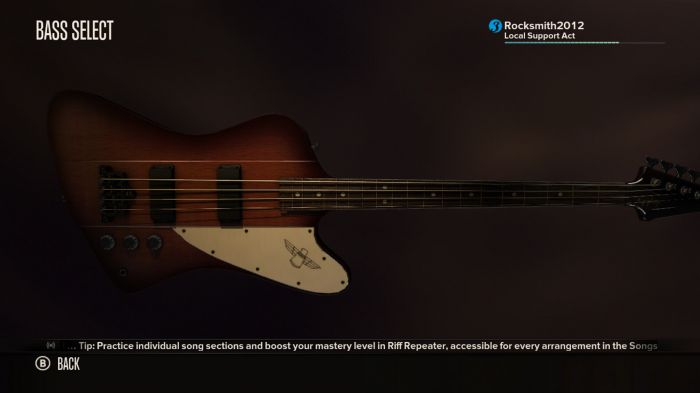
With a wide range of songs and more available as DLC, Rocksmith allows for anybody from a complete novice to a pro guitar player to pick up and play this game and have a great time whilst doing it. It can help build you up or perfect those skills you just couldn’t master (so much so that I’ve found my mum playing the game and she hates games!). So put away your plastic instruments and pick up a real guitar!
Rocksmith (Reviewed on Xbox 360)
This game is great, with minimal or no negatives.
Rhythm games have been around since the dawn of time (well, the 1970s, but that’s before my time so as far as I’m concerned, it’s the dawn of time), starting in the form of dancing games and later adding instruments into the mix.










COMMENTS